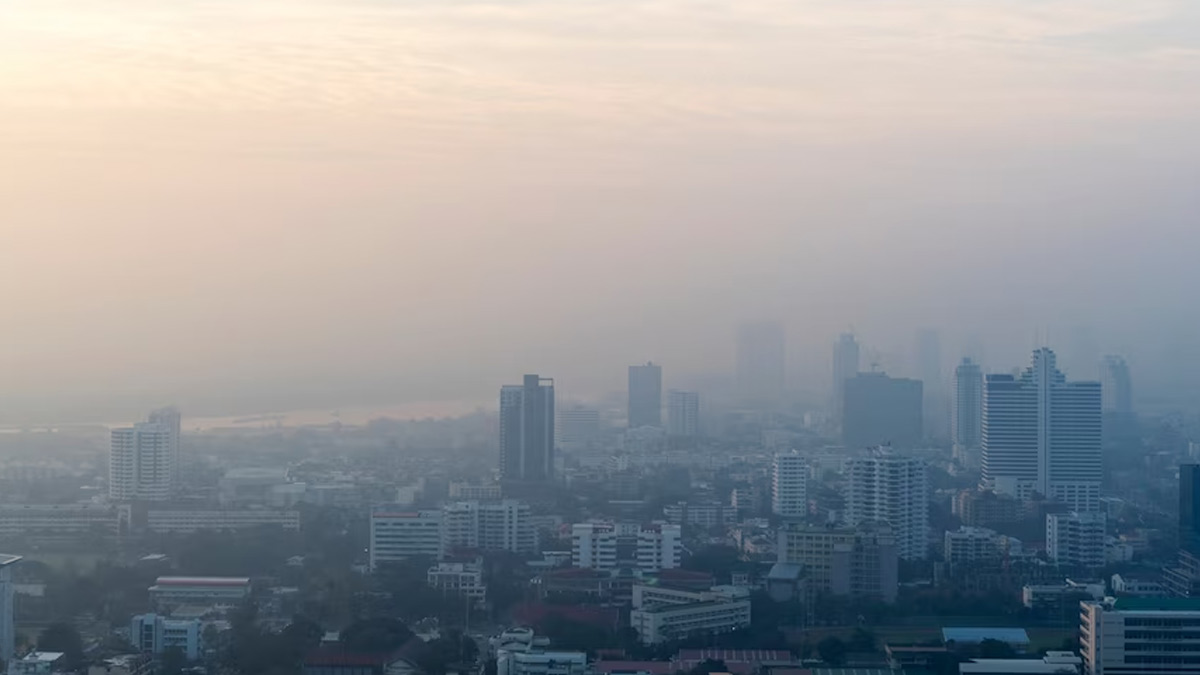
With a population of 1.4 billion people and a rapidly developing economy, India is bound to have massive amounts of pollution. However, The Air Quality Life Index (AQLI) 2023, released by the Energy Policy Institute, University of Chicago has revealed some shocking facts that are bound to make all Indians anxious.
‘Since 2013, about 59 per cent of the world’s increase in pollution has come from India alone,’ the study stated. The AQLI data suggests that due to its huge population, India faces the greatest health burden from air pollution in the world. Moreover, an average Indian’s life expectancy is bound to be shortened by 5.3 years if their consistent exposure to the toxic air of the country persists.
Delhi: Most Polluted City In The World

As per the AQLI data, Delhi has emerged as the ‘most polluted megacity city in the world,’ where the residents are likely to lose 11.9 years when compared to the 5 µg/m3 limit set by the World Health Organisation (WHO), and 8.5 years when compared to the national guideline. As per reports, Delhi has an annual average particulate pollution of 126.5 µg/ m3, which is astonishingly 25 times more than the limits defined by WHO guidelines.
Also Read: Expert Explains Impact Of Air Pollution On Mental Health
Satellite-derived data of the particulate matter in India’s air revealed that pollution levels in India are 10 times more than the limits set why WHO. The study found that 67.4% of the country’s population resides in areas that exceed the national air quality standard, and are exposed to particulate pollution levels that are 51.3% higher than they were in 2000. Even in the least polluted district of Pathankot, air pollution is more than seven times the WHO limit.
AQLI 2023 report also stated, ‘Particulate pollution is no longer just a feature of the Northern Plains of India. In the Indian states of Maharashtra and Madhya Pradesh, home to 204.2 million people, pollution has risen by 76.8 and 78.5 per cent, respectively, since 2000.’
The study labelled two factors as major reasons for this whopping increase in particulate matter in India’s air. Firstly, the number of vehicles on the road has increased by four times since the early 2000s, and electricity generation from fossil fuels tripled from 1998 to 2017.
Protect Yourself From India’s Toxic Air

The shocking facts revealed by the AQLI data only leave one practical option in front of all Indians, especially Delhiites. It is probably best to move to a different place that has much better air quality. However, this tactical approach might not be so pragmatic for many residents, who have jobs, family, and friends to consider before uprooting their entire life and escaping from this gas chamber.
Also Read: Indoor Air Pollution: Causes & Ways To Reduce It
If that is your case, the least you can do is to ensure that the best practices are being employed to stay comparatively safe from extreme levels of particulate pollution:
- Monitor Air Quality: Stay informed about the air quality in your area by using reliable air quality monitoring apps or websites. These provide real-time data and forecasts, allowing you to plan your activities accordingly.
- Limit Outdoor Activities: On days when air quality is particularly poor, try to reduce your outdoor activities, especially during peak pollution hours. Early mornings and late evenings often have lower pollution levels.
- Use Air Purifiers and Indoor Plants: Install high-efficiency particulate air filters in your home. Air purifiers can help remove pollutants and improve indoor air quality, creating a safer environment. Alternatively, consider adding indoor plants like snake plants, peace lilies, and spider plants to help improve indoor air quality naturally.
- Close Windows and Doors: Keep windows and doors closed to prevent outdoor pollutants from entering your home or workspace. Use weatherstripping to seal any gaps that may allow outdoor air to seep in.
- Wear Masks: When you must go outside on days with hazardous air quality, wear N95 or N99 respirator masks. These masks can filter out fine particulate matter and provide some protection.
- Stay Hydrated: Proper hydration can help your body flush out toxins more effectively. Drink plenty of water to support your overall health.
- Avoid Smoking and Secondhand Smoke: If you smoke, try to quit. Avoid exposure to secondhand smoke as it can exacerbate the effects of air pollution on your health.
- Use Air-Conditioning Wisely: If you have air-conditioning, set it to recirculate indoor air to prevent drawing polluted outdoor air inside. Ensure your AC filters are clean and replaced regularly.
- Reduce Use of Personal Vehicles: Consider using public transportation, carpooling, or cycling on days with better air quality. Reducing vehicle emissions can significantly contribute to cleaner air.
Leaving your home city or home country might not be the most ideal choice. However, as the AQLI study has pointed out the immensely dangerous implications of the toxic air of India, practising all measures to protect yourself must be your top priority. Regularly clean and dust your home to prevent indoor pollutants from settling. Vacuum with a HEPA filter-equipped vacuum cleaner. You should also support initiatives and policies aimed at reducing air pollution, and encourage clean energy sources and sustainable transportation options.
Remember that while these steps can help reduce your exposure to air pollution, it's crucial for governments and communities to work together to address the root causes of air pollution and implement long-term solutions for cleaner air. Staying informed and taking proactive measures can go a long way in protecting your health in areas with high levels of air pollution.







